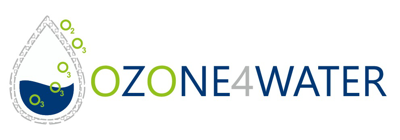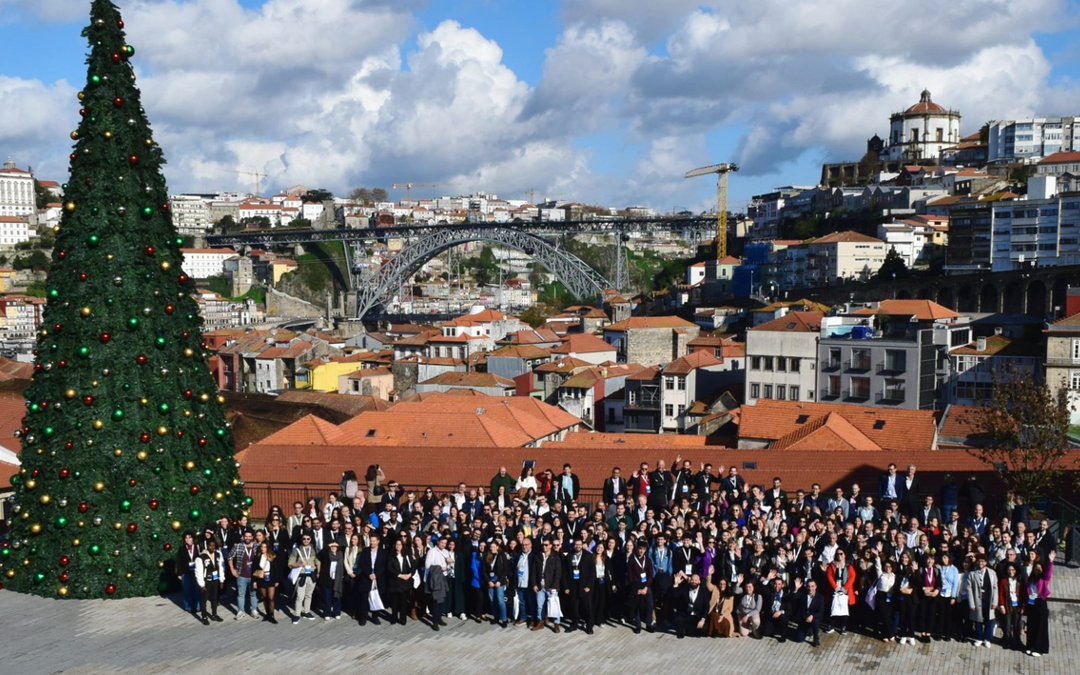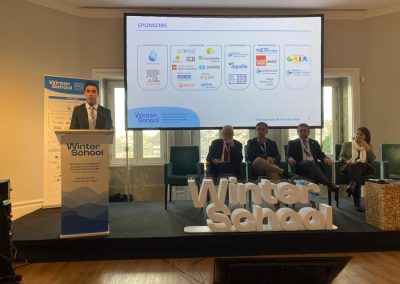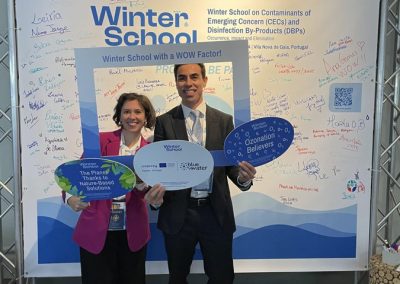(World of Wine, Vila Nova de Gaia, 25-26 November, 2024)
The Winter School was held in the World of Wine, Vila Nova de Gaia, Portugal, from 25th to 26th November 2024, organized by the Faculty of Engineering of the University of Porto, Faculty of Science and Technology of the University of Coimbra, NOVA School of Science and Technology of NOVA University Lisbon and Galician Enterprise-University Foundation.
The Winter School presented an overview of the current state of knowledge and the latest advances regarding the occurrence, impact, and elimination of Disinfection By-Products (DBPs), Contaminants of Emerging Concern (CECs), and microbial contamination to provide solutions face to risks in providing safe drinking water and alternative water sources for crops production.
The Winter School included: (i) a section specifically devoted to PhD students (“Floor to Students”) where they had the chance to present a poster communication, as well as to meet experts from the School; (ii) a workshop on Publishing Perspectives; (iii) workshop on European Directives on Drinking Water, Water Reuse and Urban Wastewater Treatment; (iv) lectures on Complementary Skills related to high-throughput methodologies for the determination of DBPs, CECs, PFASs, microplastics, ARB and ARGs, environmental and health impacts and prevention measures and, technologies for control of DBPs, CECs, PFASs, microplastics, ARB and ARGs; (v) workshop on Wastewater Treatment and Reuse; and (vi) a co-creation workshop on Future Challenges in Drinking Water Sector – public engagement, communication and raising awareness; (vii) networking Opportunities and Exhibition of water treatment related products and services.
The workshop on publishing perspectives was given by Executive Editors of the Journal Environmental and Chemical Engineering (Elsevier) and featured a coffee break sponsored by Elsevier. A range of topics were covered concerning the publication of scientific articles, starting from their preparation, going through the review process, and ending with the editorial decision and possible transfers of rejected manuscripts to alternative journals. The publisher´s, editor´s, and author´s points of view were discussed, and the workshop was concluded with a roundtable during which questions were taken from the audience.
The workshop on European Directives on Drinking Water, Water Reuse and Urban Wastewater Treatment, with the participation of Water Europe, National Laboratory of Civil Engineering (LNEC) and Water and Waste Services Regulation Authority (ERSAR), presented the news and challenges regarding drinking water, wastewater treatment and reuse. An overall situation of Poly- or Perfluoroalkyl substances (PFASs) was also addressed.
Lectures on complementary skills were given by senior researchers, professors and professionals, with high expertise in the topics of: i) high-throughput methodologies for the determination of DBPs, CECs, PFASs, microplastics, ARB and ARGs, ii) environmental and health impacts and prevention measures and, iii) technologies for control of DBPs, CECs, PFASs, microplastics, ARB and ARGs (e.g., ozonation, advanced oxidation processes, membrane filtration, adsorption, biological oxidation, nature-based solutions), as other topics such as CFD simulation, LCA/LCC and water digitalization.
The workshop on Wastewater Treatment and Reuse included several invited talks from i) coordinators of European projects funded by Life, INTERREG, WaterJPI, and Horizon Europe programs, as well as Portuguese Recovery and Resilience Plan, presenting the project goals and main results, ii) water utilities (Águas do Tejo e Atlântico) and companies (Xylem, USP Technologies, ADVENTECH, Aqualia, Arrow Lake AB and Air Liquide), showing case studies and real applications; iii) round table discussion addressing current industry trends, challenges, or innovations.
The co-creation workshop on Future Challenges in Drinking Water Sector – public engagement, communication and raising awareness included i) goals and challenges of ZeroPollution4Water Cluster, H2OforAll, IntoDBP and SafeCREW Horizon Europe projects, Portuguese scenario regarding DBPs, Australia and USA scenarios on DBPs, and ii) round table discussion in the following topics: DBPs technologies for drinking water treatment; Analytical techniques; Public engagement; Legislation; Preventive measures; How to increase the acceptance of tap water. The workshop also included invited talks from companies (De Nora Water Technologies Italy S.r.l., Air Liquide, Lutz Jesco GmbH).
The Winter School was attended by 254 participants from 22 countries, with 53 invited talks, 77 poster communications, 4 RoundTable discussions, and 20 sponsors, with an exhibition area with 12 stands from companies and water utilities.
The Winter School also included several social events: 1) Walking Tour through Historic Places of Vila Nova de Gaia and Porto; 2) Porto de Honra (Welcome Drink) and Women’s Engineering Tuna of the University of Porto; 3) Visit to Ferreira Wine Cellars and 4) Dinner at Sancho Panza.
Vítor Vilar was one of the Winter School chairs, and several other members of the OZONE4WATER project (Cristiana Gomes, Francisca Moreira, Inês Rodrigues, Laura Cullen, and Paulo Marrocos) were members of the Local Organizing Committee, presenting several poster communications entitled: “Design of an ozone side stream injection scheme: assessment of the influence of nozzle length on mixing efficiency”, “Design of a contact/reaction tank for ozone sidestream injection systems using computational fluid dynamics”, “Cutting-edge ozone technology for water treatment”, “PDMS membrane for O2/O3 gas separation using a spiral wound module”, and “Sustainability assessment of sidestream injection systems for ozone water treatment: Venturi vs NETmix gas/liquid injectors”.




